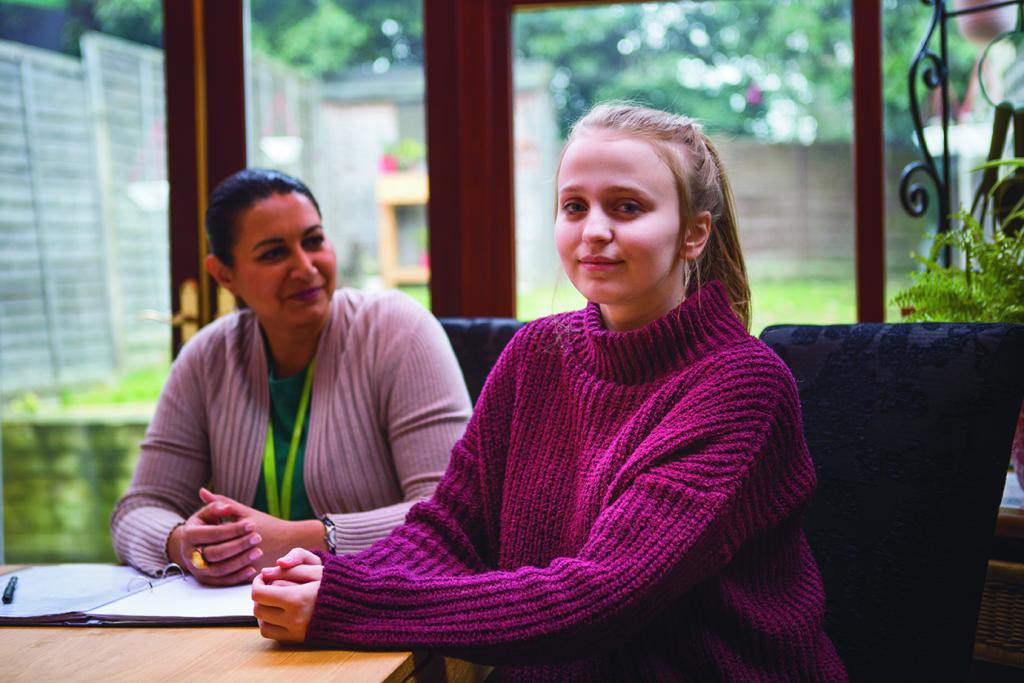No child should be punished because a relative is in prison. Barnardo’s is one of the few organisations in the country that supports children and their families with relatives in prison.
How are children affected by having a relative in prison?
We know that children who have a parent in prison can feel isolated and ashamed - and most feel unable to talk about it because they're scared of being bullied.
These children are often left in the shadows, their needs forgotten, and this can have devastating impacts. Despite their situation, they are locked out of the support they need to give them a better chance in life.
It is estimated that around 200,000 children in England and Wales have a parent sent to prison each year*.
*Department for Education (2024); Keeping children safe in education 2024.
Children and young people will be impacted by having a parent or relative in prison, just as children and young people are affected by any challenging or traumatic event they experience.
For children and young people, having a relative in jail or prison can lead to:
-
poor physical and mental health
-
breakdown/lack of support networks (especially if the relative now in prison acted as a primary carer)
-
significant trauma if they witnessed elements of criminal activity, and even the arrest of their relative
-
feelings of loss or rejection
-
fear of being stigmatised and judged by the ‘prisoner’ label
-
additional care responsibilities placed on the child
-
an effect on school (an absence from education and/or lower school grades)
Signs and indicators that a young person is being affected by a relative being in prison
You might notice:
-
changes in behaviour, such as becoming more reclusive than normal
-
changes in their mental health and wellbeing, being less able to regulate their emotions
-
signs of the loss and grief they may be feeling
-
difficulties paying attention at school, losing interest in school or missing school
Children with parents or relatives in prison may require additional support from trusted adults around them. Supporting a child with a relative in prison is vital to ensuring these affects don’t escalate.
If you’re worried about a child, you can find help and more information about our services here.
How can adults support children with relatives in prison?
It’s important to tell children the truth about where their relative has gone, even if the child is very young. There are ways to explain to your child in an age-appropriate way that their relative has gone to prison, and be honest about how long they will be gone for. As with conversations about loss, the best way to explain is to use clear, literal language rather than euphemisms.
It’s important to be aware that it’s likely a child will hear things from others in the community and may feel betrayed, or even more distressed, to hear it from someone else.
Older children especially are likely to understand what’s happening and may feel strong feelings of anger or disappointment. These feelings are normal, and the child should be given space to feel them.
Children should be given the choice as to whether they wish to visit their relative, or not, as much as possible. The experience of visiting their relative could cause many conflicting emotions to arise, so also consider how the child is supported before and after a visit.
Children with relatives in prison may not talk openly about it, for fear of the stigma or judgement that they may face from others. You may not even be aware that a relative of theirs has gone to prison. If you’re worried about a child and their behaviour, the best thing to do is to talk to them about your concerns and create a space for them to feel safe and supported.
How to have open conversations with children about relatives in prisons
Although difficult, try encouraging the child or young person to talk with you. It’s important to show this is a safe place for them, so lead with respect and keep the conversation free of judgment.
When speaking to children or young people remember to:
-
allow them time and space to feel their emotions. These conversations could be quite overwhelming, so make sure to prioritise their mental wellbeing and check in regularly with how they are feeling
-
discuss the child’s needs with them, focus on what support they might need and reassure them. It’s best to focus on them rather than the relative's offence
-
remind them that this situation is not their fault, and that they are not alone
-
discuss support available to them, and consider involving them in peer support groups
For more advice about talking to children about feelings and wellbeing see our guides written by experts:
How do we support children with relatives in prison?

We are one of the few organisations to help children with a parent in prison. We run training services for professionals as well as services in the community and in prisons to help maintain contact and support family relationships.
We also campaign across the UK to get these children's voices heard and their needs addressed.
It’s made a big difference in class really. I was struggling with things and as I’ve been talking to [a Barnardo's project worker] it’s made me feel I can do anything I want to do. I’ve got better at my lessons because she said I am good at things and I can do it.
Daniel, young person
Further support and information for children and families with relatives in prison:
Prisoners’ Families Helpline
You can find more information online, or get in contact on their freephone at 0808 808 2003.
Safeguarding Network - Children with family members in prison
Childline - Parents in prison
Children Heard and Seen

Support for parents and carers
Every child should grow up feeling loved and supported. We provide a range of services to help and support families across the UK.

Mental health services for children and young people
No child should be left to deal with poor mental health alone - and that’s why we offer a range of mental health support services for children, young people, and their families.

Support our work
You can help us support every child that needs us. Find out the different ways you can donate below.
